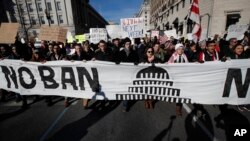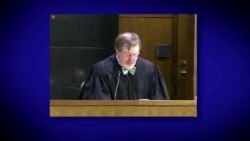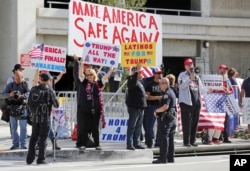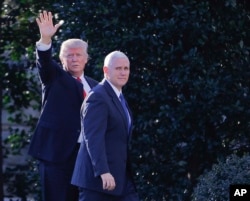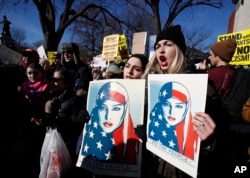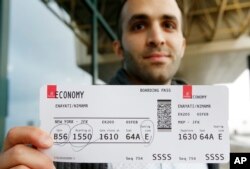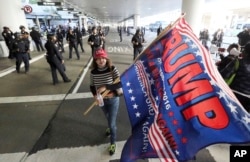President Donald Trump is telling the American people that if "something happens," blame the judge who blocked his ban on immigration from seven Muslim majority countries.
In one of his trademark tweets Sunday, the president said he "just cannot believe a judge would put our country in such peril."
Late last week, U.S. District Court Judge James Robart of Washington state temporarily blocked Trump's executive order halting travel to the U.S. by refugees and others from seven Muslim majority countries: Iran, Iraq, Libya, Somalia, Sudan, Syria and Yemen. Then on Sunday, the 9th U.S. Circuit Court of Appeals in San Francisco rejected the Trump administration's demand to reinstate the travel ban.
In his Sunday tweets, Trump said he has ordered the Department of Homeland Security to check people entering the U.S. "very carefully," adding that the courts have made the job "very difficult." He also singled out Judge Robart again, saying, "The judge opens our country to potential terrorists and others that do not have our best interests at heart. Bad people are very happy!"
The appeals court has given federal officials and states until Monday to file more arguments on whether the ban should be declared unconstitutional or reinstated. The case likely will wind up in the Supreme Court.
The Justice Department's appeal said the judge's decision "second guesses the president's national security judgment" and harms the public by "thwarting enforcement" of Trump's executive order.
Vice President Mike Pence defended Trump’s criticism of Judge Robart, saying the president expresses himself in a “unique” way and the American people find it refreshing.
“The judge’s action in this case about making a decision about American foreign policy and national security, it’s just very frustrating to the president,” Pence told NBC's Meet the Press Sunday.
But Senate Republican Majority Leader Mitch McConnell said on CNN he thought it was “best not to single out judges for criticism."
“We all want to keep terrorists out of the United States, but we can’t shut down travel. We certainly don’t want our Muslim allies who fought with us in countries overseas not to be able to travel to the United States. We need to be careful about this," McConnell said.
House Minority Leader Nancy Pelosi, a Democrat from California, told NBC Sunday she would be willing to work on legislation to allow for a temporary suspension “as long as we are honoring the Constitution.”
“We always have to subject our vetting to scrutiny to see if it’s working, but doesn't mean we institute an unconstitutional, immoral ban on Muslims coming into the country,” she said.
After the judge's decision, the Customs and Border Protection Service started to allow travelers with valid visas to come to the U.S.
Several major airlines, including Air France and British Airways, began allowing passengers from the seven countries banned by the executive order to board planes headed for U.S. territory.
But a Somali refugee said about 140 refugees whose resettlement in the United States was blocked by Trump's executive order were sent back to their refugee camp and it was unclear if or when they could travel.
The group had been expected to settle in the U.S. this week, but was sent back to the Dadaab camp in eastern Kenya on Saturday from the International Organization for Migration transit center in Nairobi where they had been staying.




